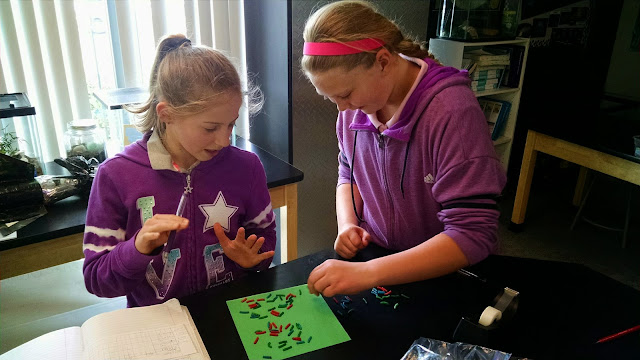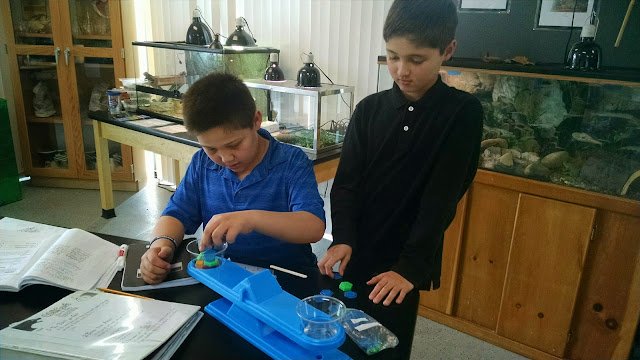Friday, October 16, 2015
25 Strangest Geological Formations On Earth
Thursday, October 15, 2015
Leaf Classification
What type of leaf is #1, #2, and #3? What are some ways other than by vein pattern can you classify leaves?
Wednesday, October 14, 2015
Pink Sand Beach
Time for some blog homework 6th grade! Read the article linked below and explain why the sand on this beach is pink. Pretty amazing right!?!
http://www.harbourislandguide.com/pink-sands.htm
Monday, October 12, 2015
Wheat Seeds Switch
What differences did you notice between each of your plants? How did plants always grown in the light compare to the ones switched to the light? How did plants always grown in the dark compare to those switched to the dark? What conclusions can you make about plants from this experiment?
Thursday, September 24, 2015
Wheat Seeds
First blog post of the year!!! Woo hoo!! Hello awesome fifth graders. Please use the comments below to describe the differences between wheat seeds grown in the light and seeds grown in the dark. Explain what you think is happening to cause these differences
Monday, May 11, 2015
Small Intestines and Kidneys
What was the approximate length of the pig's small intestine? What 2 portions of the kidney are being pointed to by the probe?
Friday, May 8, 2015
Thursday, April 30, 2015
Wednesday, April 29, 2015
Pig Dissection Day 1
What observations were you able to make about the external anatomy of your pig? Is your pig a male or female? How do you know?
Tuesday, April 21, 2015
Monday, April 13, 2015
Chemistry in a Bag
What were you able to determine by doing the experiments in a bag that you were not able to determine by doing the experiment in a cup?
Thursday, April 9, 2015
Chemical Reactions
What were some of the products in today's reactions? Was your hypothesis support or not support by your observations? Which reactions were exothermic? Was does that mean?
Wednesday, April 8, 2015
Nature Walk
Tuesday, April 7, 2015
Classifying Leaves
2. How do you write a correctly punctuated scientific name?
3. Why don't we just use the English or common name for organisms in science?
4. Recall the leaves you classified. What are three leaf traits or characteristics you used to classify the leaves?
Friday, March 27, 2015
Tuesday, March 24, 2015
Saturated Salt Solution
How many grams of salt did it take to saturate 50ml of water? What does saturated mean? What did we use as a solute? Do you think the water could hold more salt if the water was heated or cooled?
Natural Selection Graphs and Analysis
Monday, March 23, 2015
Natural Selection Lab
How did the color of the environment (paper) effect the population (macaroni)? What happened after several generations? What do you predict will happen when you use white paper? What do you think would happen to these species if there were no predators? What would need to occur for speciation to occur? How does this activity relate to evolution, natural selection and the fitness of a species?
Wednesday, March 11, 2015
Cracking Your Genetic Code Response
What do you think are the benefits and disadvantages of knowing the contents of your genome? Would you want to know your chances of getting a disease that you could do little about (like Huntington's disease)? What would be the consequences of knowing? Do you think those consequences out weigh the benefits? Would you do things differently if you found out that you would get the disease? If so, what would you do differently? If not, why?
Your response should be a minimum of 250 words and answer all of the above questions. Responses should show thoughtful reflection. I recommend that you copy and paste your comment from a word document just in case it erases (so that you do not cry yourself to sleep). You are welcome to turn in a hard copy. This will replace a test for CH 14 and will be worth 50 test points.
Tuesday, March 10, 2015
Wednesday, February 25, 2015
Tuesday, February 24, 2015
Monday, February 23, 2015
Monday, February 9, 2015
Salt Concentration Lab
Wednesday, February 4, 2015
Tuesday, February 3, 2015
Koolaid Concentration
What were the solute and solvent in today's lab? Which solution was most concentrated? Which was most diluted? What caused solutions to be more concentrated?
Wednesday, January 28, 2015
Salt Solution
How were you able to determine the mass of the salt in your salt solution? Was this a direct or derived measurement?
Tuesday, January 27, 2015
Banana DNA
Why did we add each solution to the banana? Describe what the DNA looked like. Do you think it would differ in appearance if we used a different fruit? Why/why not?



















































